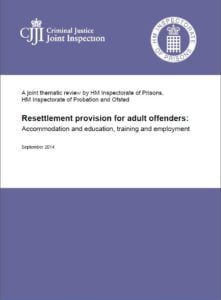Resettlement provision for adult offenders
A recent (24 September 2014) thematic inspection report jointly conducted by the Prison and Probation Inspectorates and Ofsted into accommodation and education, training and employment (ETE) services for released prisoners made for interesting reading.
Some of the report’s findings were predictably depressing:
- Contact between offenders and offender supervisors or managers varied considerably
- Even where there was good contact, this had little impact on accommodation and ETE outcomes at the point of release (although contacts were more effective post-release)
- Sentence planning and oversight were weak and resettlement work in prisons was insufficiently informed either by an individual assessment of the offender concerned or a strategic assessment of what was available on release
- Information sharing across prison departments was poor overall
Less predictably, the report focuses on the importance of families on resettlement prospects.
[divider]
The basis for the report
Somewhat unusually, the inspection report is based on specially commissioned research – the findings from following a cohort of 80 offenders from prison through the gate into the community, identifying their accommodation and occupation status shortly  before release, on release and one and six months later.
before release, on release and one and six months later.
This cohort was selected because the offenders were already subject to statutory supervision on release as they were serving sentences of one year or more and the report was clearly commissioned in order to assess the prospects of the new cohort of short terms offenders who will receive statutory supervision when the provisions of the 2014 Offender Rehabilitation Act are implemented, currently expected when new providers take over Community Rehabilitation Companies in April 2015.
[divider]
Findings
The report highlighted the fact known to most in the field that finding accommodation on release is almost impossible:
“Shortages of affordable rented accommodation, references, a lack of resources to pay deposits and rent in advance, and the practical problems of arranging accommodation from inside prison, meant that rented accommodation in the private or social housing sectors was not an option for any of the offenders we followed.”
Of course, having somewhere sustainable to live was an essential prerequisite to getting and holding down a job. Without a secure place to live, it was very difficult to get a job; without a job, it was difficult to afford a place to live.
“None of the offenders in our cohort ended up using the vocational skills or training they had received in prison in employment after release.”
The role of the family
Where the report is interesting is its focus on the importance of the family. More than half the offenders in our cohort returned home or moved in with family and friends on release, even if this was only a temporary measure. The few who had a job on release had mainly arranged this with the help of previous employers, family or friends. The inspectors concluded that:
“an offender’s family are the most effective resettlement agency.”
The report acknowledges that sometimes an offender’s family may be the victims of their crime and sometimes they may be a negative influence that contributes to their offending behaviour but in most cases it recommends that helping offenders maintain or restore relationships with their family and friends should be central to the resettlement effort.
The report found that too often, family relationships are seen simply as a matter of visits which may be increased or reduced according to an offender’s behaviour. There was no evidence that families were involved in sentence planning for instance, even when an offender said they were relying on them for support after release.
I am aware that several of the would-be new probation providers have included family workers within their operating models, it remains to be seen if these new workers can have a positive impact on resettlement – and of course, reoffending rates.







